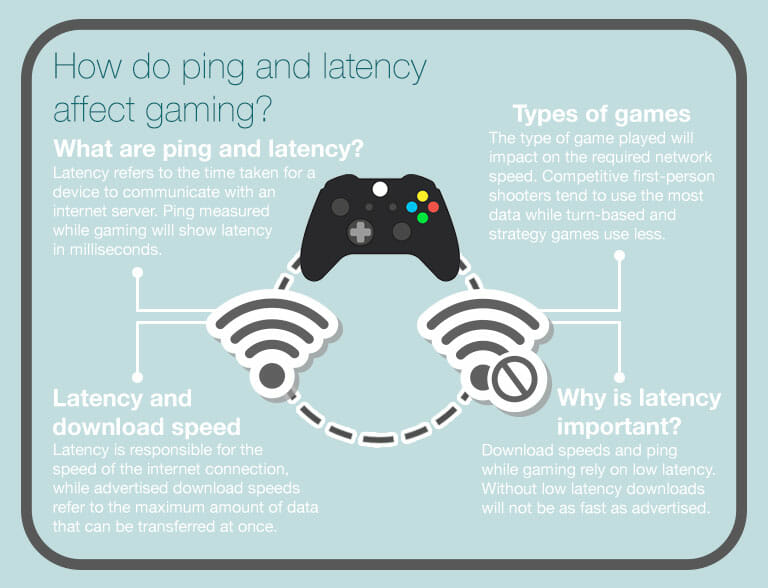Ask any member of the online gaming community and they will confirm that reliable broadband is essential. Whether you’re playing the odd game in your spare time or consider yourself to be a pro – having an internet connection that is slow or prone to cutting out will inevitably lead to frustration.
It is widely agreed that the search for a ‘good’ gaming broadband service needs requires mindfulness of a range of factors: download limits, traffic management and tech support are typical considerations – in addition to cost.
However, speed is typically the sticking point for many gamers. Slow broadband can increase ping rates and affect the amount of lag you experience.
So, if you’re thinking about investing in a speedy broadband connection to accommodate your online gaming sessions, what is it you really need to consider when looking for a package?
What is the minimum speed required for online gaming?
Luckily, the minimum download speed required for online gaming is relatively low. Many console and game manufacturers suggest that a download speed as low as 1Mbps is enough – a speed that is catered for by almost every broadband provider in the UK.
As promising as this is, particularly for gamers in more remote areas, it should be noted that this is a suggested minimum – gaming with a 1Mbps connection may not provide an adequate experience. You’d be wise to opt for a deal with a faster connection where possible.
What type of gamer are you?
This isn’t a frivolous question – the type of games you’re into will affect the type of connection that’s serviceable for you.
If you seek the thrill of first-person shooters or arena-based ‘death matches’ in which competitors require fast reaction times, lag on your connection will mean the difference between winning and losing.
At the opposite end of the spectrum are strategy and turn-based role-playing games, in which the player is given time to present a decision or carry out an action. In that type of scenario, having the fastest connection speed isn’t necessarily imperative; a small amount of lag will not have as much of an impact on gameplay.
Will you be sharing your broadband connection?
It’s vital to consider who else will be using the broadband connection concurrently. If you live in a busy household with other people, your connection is highly likely to be slower due to the demand on available bandwidth and competing priorities.
In this situation (particularly if other people in the house are also gamers) it is recommended that you opt for an ISP which can provide a reliable and resilient connection, in order to ensure that you avoid drop-outs and slowdown. It is widely recommended that you at least double the minimum required connection speed for online gaming if you are using a shared connection.
If you live alone, or you are the only heavy user of the internet in your household, you are likely to find that your connection is significantly faster than if it were shared with others.

Lower ping rates and improved latency
For all gamers, the ping rate experienced on the connection is one of the most important aspects of their online gaming environment. Whilst ping is related to the speed of the connection, it is more specifically used to measure latency, or lag.
Measured in milliseconds, the ping rate is a measure of the time it takes your device to receive a response once a request is sent to the server hosting your game. A lower ping rate suggests that you will experience smoother gameplay, as updates between you and the server will occur more quickly.
If you find that your game lags a lot or competing players are jumping around, it’s possible you have a high ping rate. Luckily there are a few ways to reduce this.
First, try closing all other programs using the internet, as simultaneous downloads can impact your ping rate.
If this doesn’t work, make sure no-one else is using your broadband for data-intensive activities such as streaming HD video. In a worst-case scenario, you may want to ring your broadband provider, who will be able to detect and fix any issues remotely.
You can easily check your ping rate with an online checker.
Speed is important – but what other factors should you consider?
Connection and download speeds are important when deciding on broadband for gaming, but there are alternative factors to think about when searching for the ultimate online gaming experience.
- Download limits can be detrimental. Nowadays, it’s not necessary to buy a physical copy of a game – you can download it straight to your console or computer instead. But as convenient as this is, many games are very large in size and could easily take you over your download limit. Opting for a broadband deal with unlimited data will help you avoid any nasty surprise charges.
- If you predominantly use a Wi-Fi connection at home, it’s also worth experimenting with the location of your router. Simply moving your router around could dramatically improve the quality of gameplay. Avoid placing it by a window, as you will lose some signal to outside. Large metal appliances may also interrupt your signal.
- You may also want to investigate the support a provider can offer. If you’re left without help when your connection drops, you may end up without internet far longer if your package does not provide for engineers or customer support within a specific timeframe.
- With the recent rise in professional gamers streaming their progress for others to view, a reliable connection is often more important than speed. For many people around the world, this has become a viable means of making money – in these situations it could pose a financial issue for their internet to suddenly cut out.

Does the future of competitive gaming care about speed?
Online competitive gaming is only set to grow in popularity, so it’s likely that speed – in terms of download Mbps ratings – will cease to be as important to gamers when choosing broadband, especially as newer and faster broadband technologies such as fibre-to-the-premises become more widely available.
Gamers now can opt for completely dedicated gaming broadband, from ISPs committed to offering features tailored to a better online gaming experience – for example, by guaranteeing that users will not be subjected to throttling or other network traffic-shaping techniques which might prioritise non-gaming data.

